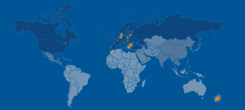

LONDON: 2010 will be a difficult year to predict, said Baxi Group UK chief executive officer, Mark Kelly, speaking to members of the press at a gathering in London last night.
"Budgets for social housing may exist, but the Government shows no sign of releasing the cash. Newbuild is slightly up, but its growth is slow,” he said.
"The Government seems hell-bent on renewables, when it should be looking at reducing the carbon footprint. The good news is that the Government is now starting to listen to manufacturers," he said.
Mr Kelly went on to relate that the Government had put back the date of Feed-in Tariffs from 5 December until mid-January. A Feed-in Tariff or renewable energy payment is a policy mechanism designed to encourage the adoption of renewable energy sources.
It typically includes three key provisions: guaranteed grid access, long-term contracts for the electricity produced and purchase prices that are methodologically based on the cost of renewable energy generation.
Under a feed-in tariff, an obligation is imposed on regional or national electricity utilities to buy renewable electricity (electricity generated from renewable sources, such as solar thermal power, wind power, wave and tidal power, biomass, hydropower and geothermal power), from all eligible participants.
Mr Kelly also reported that since Feed-In Tariffs was the easier option, he did not have much hope that the Renewable Heat Incentive to meet the UK's 2020 15% renewable energy target, would be presented according to plan in 2011.
Commenting on the successful merger of Baxi with Dutch rival De Dietrich Remeha, the deal, he said, boosted the company's capital position and created one of Europe's biggest heating products companies.
This merger has made BDR Remeha, as it will now be called, the third biggest heating company in Europe behind Bosch and Vaillant.